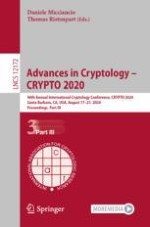2020 | OriginalPaper | Buchkapitel
New Techniques for Zero-Knowledge: Leveraging Inefficient Provers to Reduce Assumptions, Interaction, and Trust
verfasst von : Marshall Ball, Dana Dachman-Soled, Mukul Kulkarni
Erschienen in: Advances in Cryptology – CRYPTO 2020
Aktivieren Sie unsere intelligente Suche, um passende Fachinhalte oder Patente zu finden.
Wählen Sie Textabschnitte aus um mit Künstlicher Intelligenz passenden Patente zu finden. powered by
Markieren Sie Textabschnitte, um KI-gestützt weitere passende Inhalte zu finden. powered by
